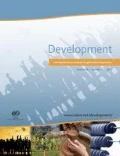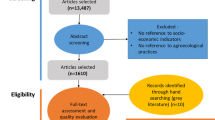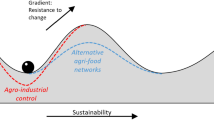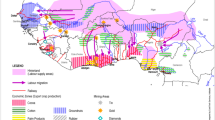Abstract
Women worldwide are contributing significantly to global economic growth but do not always receive the benefits needed to improve their own and their family's livelihoods. Women's contributions are often invisible, unrecognized and undervalued. This is especially apparent in global value chains, where harsh labour conditions in export-oriented sectors such as horticulture and the garment industry are well-documented in the literature. However, we still know very little about the agricultural sector, particularly smallholder agriculture and the contribution and position of women. Noortje Verhart and Rhiannon Pyburn use a value chain approach to look at opportunities to improve women's positions in global trade relations. Noortje Verhart and Rhiannon Pyburn illustrate that trade and trade relations are not gender neutral: they influence men's and women's opportunities to improve their position in a value chain quite differently. They demonstrate how a particular intervention in a global coffee chain is enabling the revaluation of women's contribution to coffee production.
Similar content being viewed by others
Notes
The Royal Tropical Institute (KIT) is an independent, not-for-profit organization with a mandate to alleviate poverty, support sustainable development and promote cultural preservation and exchange. The Social Development and Gender Equity and Sustainable Economic Development teams are joining forces to bring together value chain analysis with gender analysis and to tease out the compatibilities and potential synergies between the two fields. In collaboration with partners, KIT is documenting approaches that promote the rights, inclusion and participation of women in economic development.
The cooperative which is certified by Café de Mujer receives support from Hivos in the Netherlands. The case study has been documented through the Global standards Initiative of Oxfam Novib, Hivos, Solidaridad and the Royal Tropical Institute (KIT) to explore how smallholder certification is contributing to gender equity in global value chains. The Café de Mujer case study was documented by Patricia Lindo Jerez and Mieke van der Schaeghe, two consultants based in Nicaragua. The study was summarized and translated into English by Maria Jose Barney Gonzalez, a consultant based in Amsterdam, the Netherlands.
MayaCert is a Central American certification body that was created in 1997. Initially MayaCert certified only to organic standards, but over time it has expanded to cover 4C, Starbucks, Utz, Bird Friendly and Global GAP, amongst others.
Asociación de Cooperación al Desarrollo Integral de Huehuetenango.
References
Barrientos, Stephanie (2002) ‘Gender, Business and Poverty’, Issue Paper 5, University of Sussex.
Barrientos, Stephanie, Catherine Dolan and Anne Tallontire (2003) ‘A Gendered Value Chain Approach to Codes of Conduct in African Horticulture’, World Development 31 (9): 1511–1526.
Barrientos, Stephanie, Naila Kabeer and Naomi Hossain (2004) ‘The Gender Dimensions of the Globalization of Production’, Working Paper No. 17, Policy Integration Department World Commission on the Social Dimension of Globalization International Labour Office (ILO), Geneva.
Bolwig, Simon, Stefano Ponte, Andries Du Toit, Lone Riisgaard and Niels Halberg (2008) ‘Integrating Poverty, Gender and Environmental Concerns Into Value Chain Analysis: A conceptual framework and lessons for action research’, Working Paper 16, Danish Institute For International Studies.
Elson, Diane (1999) ‘Labor Markets as Gendered Institutions: Equality, efficiency and empowerment issues’, World Development 27 (3): 611–627.
Human Development Report (2003) ‘Millennium Development Goals: A compact among nations to end human poverty’. Published for the United Nations Development Programme (UNDP), Oxford University Press.
Humphrey, John and Lizbeth Navas-Alemán (2010) ‘Value Chains, Donor Interventions and Poverty Reduction: A review of donor practice’, IDS Research Report 63.
Kabeer, Naila (1995) ‘Benevolent Dictators Maternal Altruists and Patriarchal Contracts: Gender and household economics’, in Naila Kabeer (ed.) Reversed Realities: Gender hierarchies in development thought, London: Verso.
Kabeer, Naila (2003) ‘Gender Mainstreaming in Poverty Eradication and the Millennium Development Goals: A handbook for policy-makers and other stakeholders’, Canadian International Development Agency, http://www.idrc.ca/openebooks/067-5/, accessed 20 May 2010.
KIT (2007) ‘Factsheet 7 Gender and Poverty’, Economic Rights Theme.
KIT, Faida MaLi and IIRR (2006) ‘Chain Empowerment: Supporting African Farmers to Develop Markets’, Royal Tropical Institute, Amsterdam; Faida Market Link, Arusha; and International Institute of Rural Reconstruction, Nairobi.
Oxfam International (2004) ‘Trading Away our Rights Women Working in Global Supply Chains’, www.maketradefair.com.
Randriamaro, Zo (2006) ‘Gender and Trade BRIDGE’, Cutting Edge Pack series.
Riisgaard, Lone, Simon Bolwig, Frank Matose, Stefano Ponte, Andries Du Toit and Niels Halberg (2008) ‘A Strategic Framework an Toolbox for Action Research with Small Producers in Value Chains’, Working Paper 17, Danish Institute For International Studies.
Tallontire, Anne, Catherine Dolan, Sally Smith and Stephanie Barrientos (2005) ‘Reaching the Marginalised? Gender value chains and ethical trade in African horticulture’, Development in Practice 15 (3&4): 559–571.
Whitehead, Ann (2003) ‘The Gendered Impacts of Liberalization Policies on African Agricultural Economies and Rural Livelihoods’, paper prepared for the UNRISD report ‘Gender Equality: Striving for Justice in an Unequal World’, United Nations Research Institute for Social Development (UNRISD).
Acknowledgements
The article is based on data collected by the Gender and Global Standards Initiative undertaken by four organizations in the Netherlands: Hivos, Oxfam Novib, Solidaridad and the Royal Tropical Institute. The four organizations are exploring how smallholder certification contributes to gender equality on family farms and within farmer cooperatives. During the first year of this initiative (2009), ten international coffee value chains in Central America and Africa were documented, including Café de Mujer. The findings and reflections from the first phase of the initiative are published in a KIT (Royal Tropical Institute) working paper. In 2010–2011, additional case studies for coffee, cocoa and tea in Africa and Asia are being documented.
Additional information
Uses a value chain approach to look at opportunities to improve women's positions in global trade relations
Rights and permissions
About this article
Cite this article
Verhart, N., Pyburn, R. The Rough Road to Gender Equitable Growth: The case of Café de Mujer Guatemala. Development 53, 356–361 (2010). https://doi.org/10.1057/dev.2010.38
Published:
Issue Date:
DOI: https://doi.org/10.1057/dev.2010.38




